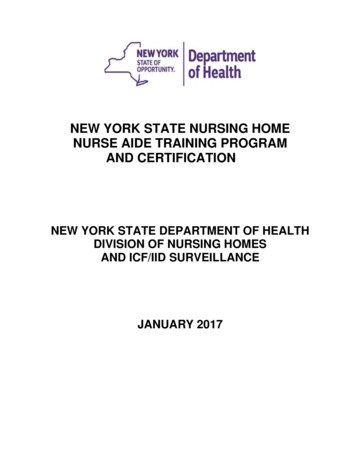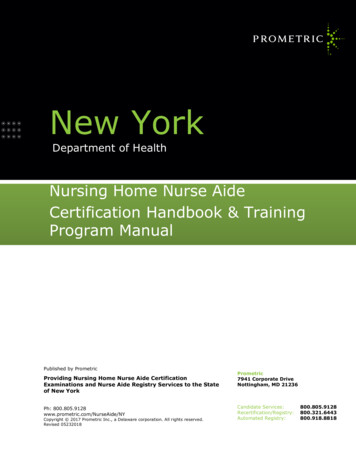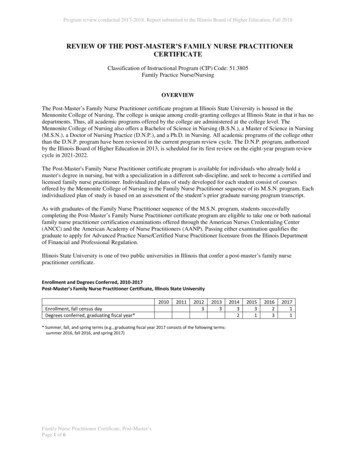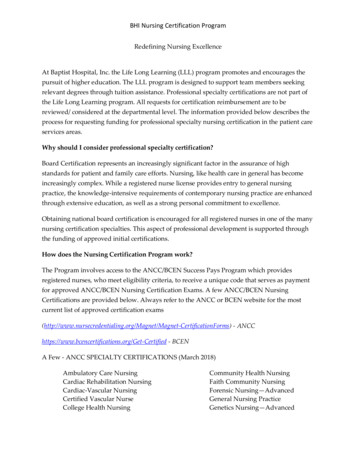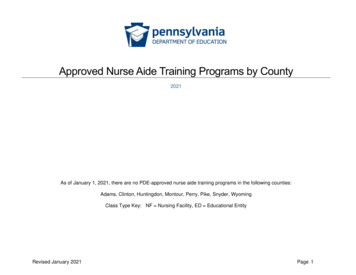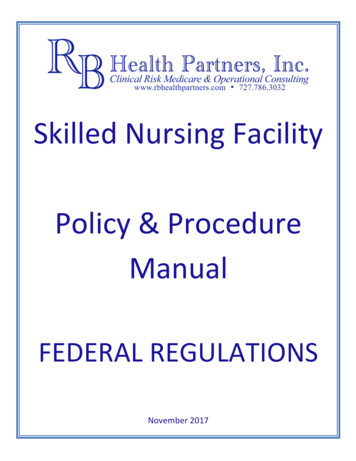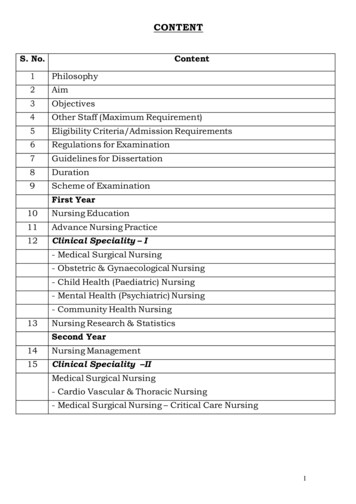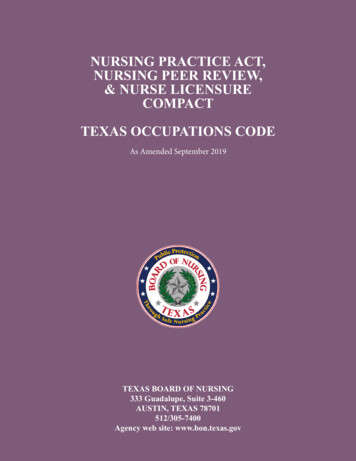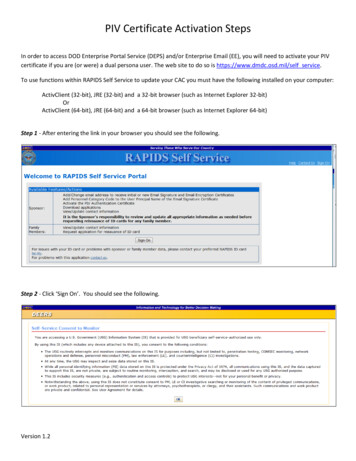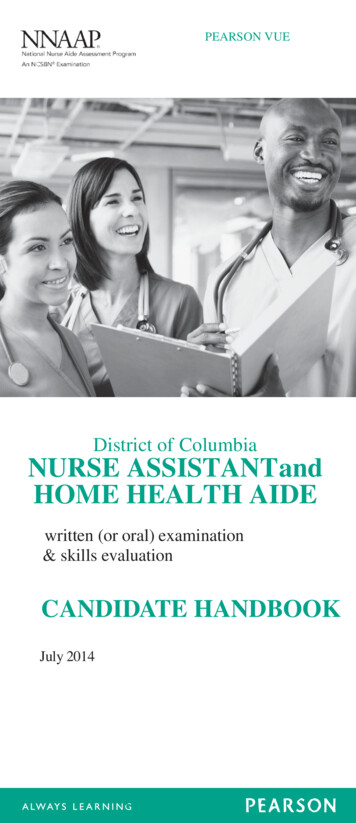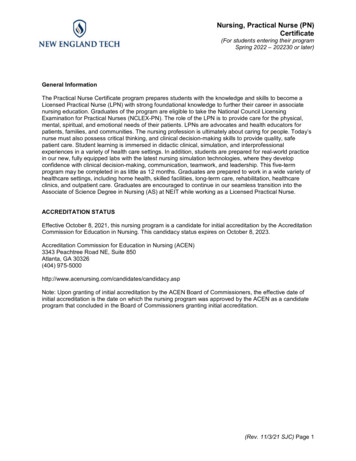
Transcription
Nursing, Practical Nurse (PN)Certificate(For students entering their programSpring 2022 – 202230 or later)General InformationThe Practical Nurse Certificate program prepares students with the knowledge and skills to become aLicensed Practical Nurse (LPN) with strong foundational knowledge to further their career in associatenursing education. Graduates of the program are eligible to take the National Council LicensingExamination for Practical Nurses (NCLEX-PN). The role of the LPN is to provide care for the physical,mental, spiritual, and emotional needs of their patients. LPNs are advocates and health educators forpatients, families, and communities. The nursing profession is ultimately about caring for people. Today’snurse must also possess critical thinking, and clinical decision-making skills to provide quality, safepatient care. Student learning is immersed in didactic clinical, simulation, and interprofessionalexperiences in a variety of health care settings. In addition, students are prepared for real-world practicein our new, fully equipped labs with the latest nursing simulation technologies, where they developconfidence with clinical decision-making, communication, teamwork, and leadership. This five-termprogram may be completed in as little as 12 months. Graduates are prepared to work in a wide variety ofhealthcare settings, including home health, skilled facilities, long-term care, rehabilitation, healthcareclinics, and outpatient care. Graduates are encouraged to continue in our seamless transition into theAssociate of Science Degree in Nursing (AS) at NEIT while working as a Licensed Practical Nurse.ACCREDITATION STATUSEffective October 8, 2021, this nursing program is a candidate for initial accreditation by the AccreditationCommission for Education in Nursing. This candidacy status expires on October 8, 2023.Accreditation Commission for Education in Nursing (ACEN)3343 Peachtree Road NE, Suite 850Atlanta, GA 30326(404) dacy.aspNote: Upon granting of initial accreditation by the ACEN Board of Commissioners, the effective date ofinitial accreditation is the date on which the nursing program was approved by the ACEN as a candidateprogram that concluded in the Board of Commissioners granting initial accreditation.(Rev. 11/3/21 SJC) Page 1
Nursing, Practical Nurse (PN)Certificate(For students entering their programSpring 2022 – 202230 or later)Program Mission, Goals and OutcomesMission StatementThe New England Institute of Technology Nursing Department seeks to prepare nurses at the associate,bachelor’s, and master’s levels to practice holistically in today’s complex and highly technologicalhealthcare system. The mission of the program is to prepare individuals as professionals whose carereflects altruistic, evidence-based, and ethical practice in the nursing profession.Nursing Program PhilosophyThis philosophy and foundation of our curriculum represents the faculty’s core beliefs regarding humanbeings, environment, health, nursing, higher education, teaching, and learning. We believe that everyperson is a unique being worthy of respect and dignity. In our nursing framework, biological and socialcomponents integrate seamlessly in individuals who use self-care to maintain their health status. We viewthe environment as the totality of the patient’s experience that includes the family, cultural context,society, and the global community. We recognize that the patient’s environment is a major influence onthe patient’s health status. Health is an individual experience characterized by wholeness where physical,psychological, interpersonal, spiritual, cultural, and social aspects are inseparable in the person. Anindividual’s response to stressors may change the ability of the patient to engage in self-care, resulting indeficits in meeting basic needs and requiring the need for nursing care. Individuals are moving towardmaturation and actualization of their full potential. Humans have universal self-care requisites and nursesneed to be tireless advocates for the patients’ pursuit of these universal needs within a caring andnonjudgmental environment.Nursing is a scientific discipline with a distinct body of knowledge. Nursing practice is grounded in nursingscience, natural sciences, social sciences, technology, and humanities. Nurses engage with clients in anactive partnership and seek to understand the client’s lived experience of illness. Within this context,nurses provide holistic evidence-based nursing care that respects and supports individual definitions ofhealth. Nurses focus on quality healthcare and advocate for diverse individuals, families, communities,and systems. Nursing practice is grounded in these paradigmatic beliefs which provide the foundation forcritical inquiry and knowledge development in nursing.Every person who wishes to pursue a career in nursing should have the opportunity to do so. Byadvancing educational access for a diverse population of students, associate degree nursing educationhas contributed to a diverse nursing workforce to meet the health care needs of culturally and ethnicallydiverse populations. Likewise, every nurse should be encouraged to pursue and have access toseamless academic progression beyond the associate degree into baccalaureate, master’s, and doctoralprograms. The Department of Nursing at New England Institute of Technology joins with other nursingorganizations in Rhode Island and throughout the nation, to advance opportunities for academicprogression within nursing. We stand ready to work together to ensure that nurses have the support theyneed to further their education. Higher education for nursing practice is grounded in a sound theoreticaland empirical knowledge base. The intent of the educational program is to address the needs of diverselearners by encouraging active participation in the learning process. Nursing education seeks to empowerstudents as future nurses while instilling an enthusiasm for lifelong critical inquiry, learning, andprofessional growth. The faculty are committed to creating supportive environments that foster adultlearning. Students have multiple opportunities to develop the core competencies that characterize a welleducated nurse.Students work closely with professors who care about them and provide opportunities for student learningand development as confident lifelong learners. The faculty use a variety of evidence-based teachingmethods that address adult students’ learning needs. Learners assume responsibility for their learningand are active participants in the learning process.(Rev. 11/3/21 SJC) Page 2
Nursing, Practical Nurse (PN)Certificate(For students entering their programSpring 2022 – 202230 or later)Nursing, Practical Nurse (PN) Certificate ProgramEnd-of-Program Student Learning Outcomes (EPSLOs)The graduates of the Practical Nurse program will be able to:1. Demonstrate effective use of technology and standardized practices that support safety andquality, effective use of strategies to reduce risk of harm to self or others, and safeguard theconfidential information acquired from any source (NALPN, 2021), (QSEN, 2020).2. Deliver patient and family centered, culturally diverse, holistic, spiritually, and ethical care thatrecognizes everyone’s unique needs, preferences, and values. (QSEN, 2020)3. Establish the core values of respect for diversity by advocating caring, excellence, and Integrity inpromoting the wellbeing of patients, self, and other health team members as a pathway to humanflourishing. (NLN, 2021).4.Demonstrate critical thinking and decision-making skills to ensure patient-centered careparticipation by working with interprofessional teams to ensure health care quality and safetyusing complex patient care situations (NLN, 2021).5. Reflect on the commitment to evidence-based practice, caring, advocacy, and safe quality care,to provide optimal health care for diverse patients and their families and practice within thevalues, framework, and legal parameters of the Licensed Practical Nurse (NALPN, 2015), (NLN,2021)6. Achieve collaboration with health care team members, by utilizing evidence, tradition, and patientpreferences in predictable patient care situations to promote optimal health status (NLN, 2021).(Rev. 11/3/21 SJC) Page 3
Nursing, Practical Nurse (PN)Certificate(For students entering their programSpring 2022 – 202230 or later)CurriculumCourse No.NRPNRPHSEN110111104100Course No.NRP120NRP121BIO107MA109Course No.NRP130NRP131NRP134NRP135PS201Course TitleTerm IFoundations of Practical Nursing IFoundations of Practical Nursing I ClinicalSurvey of AnatomyIntroduction to College Writing (COM Core)Term IICourse TitleFoundations of Practical Nursing IIFoundations of Practical Nursing II ClinicalComprehensive Anatomy & Physiology I & LabMath for Life Science (MA/SCI Core)Term IIICourse TitlePractical Nursing Medical/Surgical IPractical Nursing Medical/Surgical I ClinicalPractical Nursing Psychiatric/Mental HealthPractical Nursing Psychiatric/Mental Health ClinicalIntroduction to Psychology (SS Core)Term 0412L010010020T4242416Course No.Course TitleNRPNRP240241Practical Nursing Care of Child and FamilyPractical Nursing Care of Child and Family ClinicalC40L010T42NRP242Practical Nursing Care of Woman and Newborn404NRP243Practical Nursing Care of Woman and Newborn Clinical0102BIO133Pharmacology for the Practical Nurse412020416Course No.NRP250NRP251NRP259Term VCourse TitlePractical Nursing Medical/Surgical IIPractical Nursing Medical/Surgical II ClinicalPractical Nursing Leadership and ManagementCLT8080183404121815Total Quarter Credit Hours 79 (Total nursing credits 53, Technical HS 4, Total gen eds credits 22)Total clinical/simulation/skills/hours 900Total Program hours 1500(Rev. 11/3/21 SJC) Page 4
Nursing, Practical Nurse (PN)Certificate(For students entering their programSpring 2022 – 202230 or later)LegendC Number of lecture hours per weekL Number of laboratory hours per weekT Total Quarter Credit Hours where each lecture hour per week is one credit, every 2-4 laboratory hoursare one credit depending on the expected amount of pre- or post-lab work.PLEASE NOTE: All liberal arts core courses are listed in italics.Subject to change.(Rev. 11/3/21 SJC) Page 5
Nursing, Practical Nurse (PN)Certificate(For students entering their programSpring 2022 – 202230 or later)Degree Progress ChecklistCheck off each completed course.Technical Course RP250NRP251NRP259Liberal Arts Courses(total of 22 credits)#1#2#3#4#5Communications CoreEN 100T1Math/Science CoreBIO 107T2MA 109T2BIO 133T4Social Sciences CorePS 201T3Subject to change.Please see your advisor for anyquestions.Students are advised to take courses in theorder and in the term in which they appear onthis checklist. Any deviation may result in anextended time required to complete yourdegree as well as additional tuition and fees.Please contact your Student Advisor prior tomaking any changes to the course sequence.(Rev. 11/3/21 SJC) Page 6
Nursing, Practical Nurse (PN)Certificate(For students entering their programSpring 2022 – 202230 or later)Course DescriptionsNRP 110 Foundations of Practical Nursing I4 Class Hours 4 Quarter Credit HoursCo-requisites: HS 104, NRP 111, EN 100This course prepares students with foundational knowledge as it relates to the role of the Practical Nursein today’s healthcare settings. Students will learn fundamental concepts and skills and the nursingprocess in order to provide optimal individual and population-based patient care within the scope ofpractice of the practical nurse. Students will be introduced to nursing theory, medical terminology,effective interpersonal communication skills, holistic and culturally competent care, national patient safetygoals in nursing, critical thinking and hierarchy related to quality and safety, and evidence-based practice.Students are also introduced to basic medication dosage and calculation.NRP 111 Foundations of Practical Nursing I Clinical14 Lab Hours 3 Quarter Credit HoursCo-requisites: NRP 110, HS 104, EN 100This course is the clinical component that pairs with NRP 110 Foundations of Practical Nursing I. In thiscourse, the beginning practical nursing student will integrate content from classroom learning into theskills laboratory and clinical setting including professional behaviors and the role of the practical nurse.Students will demonstrate culturally diverse, holistic care of the patient and family, critical thinking andhierarchy with decision-making skills, quality and safety in the clinical setting, and professional practiceand nursing care aligned with the practical nurse scope of practice.NRP 120 Foundations of Practical Nursing II4 Class Hours 4 Quarter Credit HoursPrerequisites: NRP 110, NRP 111, EN 100, HS 104Co-requisites: NRP 121, BIO 107, MA 109This course is designed to build on previous knowledge learned in the Foundations of PracticalNursing I and provides the opportunity to develop additional competencies necessary to meet thecare of the adult, surgical, and geriatric population.Students will discuss nursing theory as it relatesto safe and effective care of the adult patient population. Students are introduced to potential riskfactors, nutritional and cultural considerations of the surgical and geriatric patient, critical thinkingand decision-making skills related to care for the immobilized patient, and the effects ofmedications on diverse patient populations. Students will continue to demonstrate knowledge ofmedication dosage and calculations.NRP 121 Foundations of Practical Nursing II Clinical14 Lab Hours 3 Quarter Credit HoursPrerequisite: NRP 110, NRP 111, EN 100, HS 104Co-requisite: NRP 120, BIO 107, MA 109This course is the clinical component that pairs with NRP 120 Foundations of Practical Nursing II.Students apply the knowledge obtained from the didactic portion of courses to their skills lab and patientcare settings. Students will demonstrate their knowledge of national patient safety outcomes as related topatient care by completing a skills checklist and clinical evaluation. Students will show culturally, diverse,holistic care to the patient and family. Students will demonstrate critical thinking and hierarchy, anddecision-making skills related to quality and safety in the clinical setting.(Rev. 11/3/21 SJC) Page 7
Nursing, Practical Nurse (PN)Certificate(For students entering their programSpring 2022 – 202230 or later)NRP 130 Practical Nursing Medical/Surgical I4 Class Hours 4 Quarter Credit HoursPrerequisites: NRP 120, NRP 121, BIO 107, MA 109Co-requisites: NRP 131, NRP 134, NRP 135, PS 201This course is part one of a two-part series focusing on medical/surgical practical nursing care of the adultclient. This course will focus on conditions associated with endocrine, gastrointestinal, urinary, sensory,cardiovascular, respiratory, musculoskeletal, reproduction systems, and infection manifestations. Thestudent will learn safe, culturally sensitive care, principles of therapeutic communication with diversepopulations, evidence-based practice, and the nursing process to prioritize the needs of adult patients.Students will build upon the knowledge of medication dosage and calculations and relate the medicationsassociated to these conditions.NRP 131 Practical Nursing Medical/Surgical I Clinical10 Lab Hours 2 Quarter Credit HoursPrerequisites: NRP 120, NRP 121, BIO 107, MA 109Co-requisites: NRP 130, NRP 134, NRP 135, PS 201This course is the clinical component that pairs with NRP 130 Practical Nursing Medical/Surgical I. In thiscourse, students will apply their previously learned physical assessment skills in the clinical setting topatients with endocrine, gastrointestinal, urinary, sensory, cardiovascular, respiratory, musculoskeletal,reproductive, and infectious conditions. Students will also demonstrate safe, culturally competent, patientcentered care to diverse populations while using evidence-based practice and the nursing process toprioritize the needs of adult patients.NRP 134 Practical Nursing Psychiatric/Mental Health4 Class Hours 4 Quarter Credit HoursPrerequisites: NRP 120, NRP 121, BIO 107, MA 109,Co-requisites: NRP 130, NRP 131, NRP 135, PS 201This course focuses on understanding common psychiatric/mental health disorders, current treatments,pharmacologic modalities, and therapeutic communication. The practical nursing student will learn how toconduct mental status exams and evaluate psychiatric disorders using standardized assessment scales,and best practices to identify therapeutic treatment settings, resources, and treatment modalities foroptimal outcomes. Students will learn to respect the needs and safety of clients with psychiatric disorderswhile preserving their rights.NRP 135 Practical Nursing Psychiatric/Mental Health Clinical10 Lab Hours 2 Quarter Credit HoursPrerequisites: NRP 120, NRP 121, BIO 107, MA 109Co-requisites: NRP 130, NRP 131, NRP 134, PS 201This course is the clinical component that pairs with NRP 134 Practical Nursing Psychiatric/Mental Health.Students will focus on understanding common psychiatric/mental health disorders, current treatments,pharmacologic modalities, and therapeutic communication. Students will perform mental health examsand standardized assessment scales in the clinical setting.NRP 240 Practical Nursing Care of the Child and Family4 Class Hours 4 Quarter Credit HoursPrerequisites: NRP 130, NRP 131, NRP 134, NRP 135, PS 201Co-requisites: NRP 241, NRP 242, NRP 243, BIO 133This course builds on concepts of previous nursing courses with an emphasis on utilizing the nursingprocess in caring for children and their families within the practical nurse scope of practice. Students willgain knowledge of physiological, cognitive, and psychosocial developmental changes occurring in thepediatric population, professionalism, accountability, and effective communication with patients, families,(Rev. 11/3/21 SJC) Page 8
Nursing, Practical Nurse (PN)Certificate(For students entering their programSpring 2022 – 202230 or later)and the inter-professional team. Students will increase their knowledge of medications and dosage andcalculations related to the pediatric population.NRP 241 Practical Nursing Care of Child and Family Clinical10 Lab Hours 2 Quarter Credit HoursPrerequisites: NRP 130, NRP 131, NRP 134, NRP 135, PS 201Co-requisites: NRP 240, NRP 242, NRP 243, BIO 133This course is the clinical component that pairs with NRP 240 Practical Nursing Care of the Child andFamily. Students will integrate knowledge of physiological, cognitive, and psychosocial developmentalchanges when caring for children in various clinical settings and simulated clinical experiences. The focusof this course is the application of nursing skills, critical thinking, professionalism, accountability, andeffective communication with children, their families/caregiver. Students will learn about the role of theinter-professional team in the community, homecare, and clinical care settings to provide safe evidencebased practice within the practical nurse scope of practice.NRP 242 Practical Nursing Care of Woman and Newborn4 Class Hours 4 Quarter Credit HoursPrerequisites: NRP 130, NRP 131, NRP 134, NRP 135, PS 201Co-requisites: NRP 240, NRP 241, NRP 243, BIO 133In this course, the practical nursing student will build upon previously knowledge and skills to learn aboutwomen’s health, family-centered nursing care, care of the childbearing families during the prenatal,intrapartum, and postpartum periods, and care of the newborn. This course will focus on the role of thepractical nurse within their scope of practice to provide patient/family-centered nursing care to culturallydiverse individuals and their families during childbearing and women’s health. The student will alsoincrease their knowledge of medications and dosage and calculations related to the childbirth and thenewborn.NRP 243 Practical Nursing Care of Woman and Newborn Clinical10 Lab Hours 2 Quarter Credit HoursPrerequisites: NRP 130, NRP 131, NRP 134, NRP 135, PS 201Co-requisites: NRP 240, NRP 241, NRP 242, BIO 133This course is the clinical component of NRP 242. The Practical Nursing students will have dedicatedtime for obstetrical clinical experiences during the prenatal, intrapartum, postpartum periods, and care ofthe newborn. The focus of this clinical is the application of nursing skills, knowledge, and critical thinkingnecessary to provide safe evidence-based practice for culturally and socially diverse childbearing familieswithin the Practical Nursing scope of practice.NRP 250 Practical Nursing Medical/Surgical II8 Class Hours 8 Quarter Credit HoursPrerequisites: NRP 240, NRP 241, NRP 242, NRP 243, BIO 133Co-requisites: NRP 251, NRP 259This course is part two of a two-part series focusing on medical/surgical nursing care of the adult client.This course will focus on common alterations in the neurologic disorders, burns, hematology,shock/trauma, multi-system organ failure, and bioterrorism. Students will learn about safe, culturallycompetent patient-centered care for diverse populations, and apply evidence-based practice and thenursing process to prioritize the needs of adult patients in their final term.(Rev. 11/3/21 SJC) Page 9
Nursing, Practical Nurse (PN)Certificate(For students entering their programSpring 2022 – 202230 or later)NRP 251 Practical Nursing Medical/Surgical II Clinical18 Lab Hours 3 Quarter Credit HoursPrerequisites: NRP 240, NRP 241, NRP 242, NRP 243, BIO 133Co-requisites: NRP 250, NRP 259This course is the clinical component that pairs with NRP 250 Practical Nursing Medical/Surgical II. In thiscourse, students will apply their previously learned knowledge and skills in the advanced clinical caresetting within their scope of practice. Students will master safe, culturally competent patient-centered careto diverse populations in the clinical setting. Students will apply evidence-based practice and the nursingprocess to prioritize the needs of the adult patient by participating in clinical simulation and interprofessional collaboration.NRP 259 Practical Nursing Leadership and Management4 Class Hours 4 Quarter Credit HoursPrerequisites: NRP 240, NRP 241, NRP 242, NRP 243, BIO 133Co-requisites: NRP 250, NRP 251This course is provided in the last term that will prepare the practical nurse to use their scope of practicefor legal and ethical considerations, effective communication as a leader, handling conflict, safedelegation and assignments, professional responsibilities, coordination care, and leading and managingcare of their clients. This course will also look at role transition from student to nurse, licensing, andresponsibilities of the newly licensed nurse. The course will also prepare the practical nurse inpreparation for taking the NCLEX-PN.HS 104 Survey of Human Anatomy4 Class Hours 4 Quarter Credit HoursThis survey course prepares students to understand basic concept of human anatomy and physiology byproviding a basic understanding of how the body functions and adapts. All systems in the human body willbe presented, with particular emphasis on those systems most commonly seen in health care.BIO 107 Comprehensive Anatomy and Physiology I and Lab4 Class Hours 4 Lab Hours 6 Quarter Credit HoursThis course is a comprehensive study of the anatomy (structure) and physiology (function) of the humanbody. Based on the interrelationship of related concepts, students will master the complementary naturethat anatomy has to physiology. Topics will include orientation to the body as a whole, skin, bones, joints,muscles, nerves, and glands. Laboratory practice includes the study of tissues by using microscopicexaminations and the dissection of animal specimens, along with histological experimentation. Unitscovered are concerned with general introductory material, the skeletal, muscular, endocrine, nervous, andsensory systems.BIO 133 Pharmacology for the Practical Nurse4 Class Hours 4 Quarter Credit HoursPrerequisites: NRP 130, NRP 131, NRP 134, NRP 135, S 201Co-requisites: NRP 240, NRP 241, NRP 242, NRP 243This course examines the complex role of the nurse regarding safe and effective medicationadministration. Pharmacological terms and concepts are introduced as they inform the safe administrationof medications. Students calculate drug dosages, explore evidence- based standards for medicationadministration, and reflect on the legal and ethical implications of drug administration. The quality andsafety competencies identified by the Quality and Safety Education for Nurses (QSEN) projects areintegrated throughout the course.(Rev. 11/3/21 SJC) Page 10
Nursing, Practical Nurse (PN)Certificate(For students entering their programSpring 2022 – 202230 or later)EN 100 Introduction to College Writing4 Class Hours 4 Quarter Credit HoursPlacement: Based on an evaluation of a writing sample or successful completion of EN 030.EN 100 is an introductory writing course designed to immerse students in the writing process andsharpen their critical thinking skills. In this course, students will practice using writing as a tool for learningby responding to readings, composing essays, and reflecting on the writing process itself. Throughdrafting, revising, and writing to learn, students will strengthen their ability to interpret, analyze, andevaluate the ideas presented in the course readings, lectures, and discussions. Conducting, evaluating,and integrating research (through summarization, quotations, and paraphrasing) is a major component ofthis course. Additionally, students will be introduced to APA citation style, and will improve essentialwriting skills such as grammar, punctuation, and standard usage.MA 109 Math for Life Science4 Class Hours 4 Quarter Credit HoursThis course is designed to assist in the understanding of the proper techniques needed to performaccurate dosage calculations; vital signs in order to ensure patient safety. This course will focus ondeveloping the mathematical skills, critical thinking and quantitative reasoning methods needed to applymedical language and systems of measurement to solve problems in a variety of healthcare settings.PS 201 Introduction to Psychology4 Class Hours 4 Quarter Credit HoursPrerequisite: EN 100This introductory course in psychology is a survey of the multiple aspects of human behavior. It includes,but is not limited to, such topics as the history of psychology, the biological foundations of behavior,memory, learning, personality, psychological disorders and treatment and social behavior. Importantly,this course will be geared to stress those areas of more practical significance for those in medical servicefields.(Rev. 11/3/21 SJC) Page 11
Nursing, Practical Nurse (PN)Certificate(For students entering their programSpring 2022 – 202230 or later)Questions & Answers1. When do my classes meet?Day Classes: Technical classes normally meet for at least three hours a day, for up to five days a week.Classes normally begin in the early morning (7:45 a.m.), late morning (usually 11:25 a.m.), or midafternoon. The time slot for your program may vary from term to term.Evening Classes: Technical classes meet on the average of three nights a week, although there may betimes when they will meet four nights a week. Classes normally begin at 5:45 p.m.In addition, to achieve your associate degree, you will take a total of approximately eight liberal artscourses which will be scheduled around your technical schedule over the course of your entire program.Each liberal arts course meets approximately four hours per week. Liberal arts courses are offered days,evenings and Saturdays.At the beginning of each term you will receive a detailed schedule giving the exact time and location of allyour classes. The College requires that all students be prepared to take classes and receive services atany of NEIT’s locations where the appropriate classes and services are offered.When a regularly scheduled class falls on a day which is an NEIT observed holiday (Columbus Day,Veterans Day, Martin Luther King, Jr. Day, and Memorial Day), an alternate class will be scheduled as amake up for that class. The make-up class may fall on a Friday. It is the student’s responsibility to takenote of when and where classes are offered.2. How large will my classes be?The average size for a class is about 20 to 25 students; however, larger and smaller classes occur fromtime to time.3. How much time will I spend in lab?Almost half of your technical courses consist of laboratory work. In order for you to get the most out ofyour laboratory experiences, you will first receive a thorough explanation of the theory behind your labwork.4. Where do my classes meet?Students should be prepared to attend classes at any of NEIT’s classroom facilities: either at the PostRoad, Access Road, or East Greenwich campus.5. I have not earned my high school diploma or GED: can I enroll in a certificate program?A candidate for admission to a certificate program must have a high school diploma, have earned arecognized equivalency diploma (GED), or meet the federal home school requirements.6. How long should it take me to complete my program?To complete your degree requirements in the shortest possible time, you should take the courses outlinedin the prescribed curriculum. For this curriculum, a student may complete the requirements in as little as15 months.Students wishing to extend the number of terms to complete the required technical courses in theircurriculum will be assessed additional tuition and fees.7. Is NEIT accredited?NEIT is accredited by the New England Commission of Higher Education. Accreditation by NECHE isrecognized by the federal government and entitles NEIT to participate in
Nurses focus on quality healthcare and advocate for diverse individuals, families, communities, . MA 109 Math for Life Science (MA/SCI Core) 4 0 4 . Course No. Course Title C L T . NRP 130 Practical Nursing Medical/Surgical I 4 0 4 NRP 131 Practical Nursing Medical/Surgical I Clinical 0 10 2 NRP 134 Practical Nursing Psychiatric/Mental .
